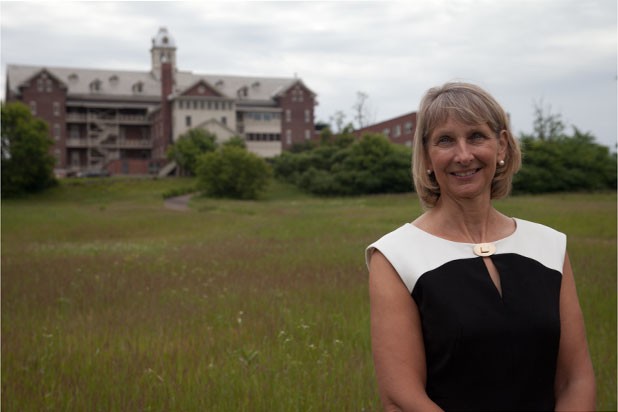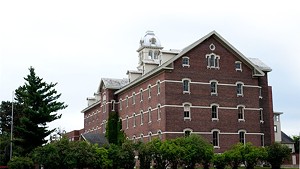
- file photo, Matthew Thorsen
- Christine Plunkett on the Burlington College campus.
Updated, 4 p.m. 7/7/14 with additional information provided by NEASC.
The association in charge of accrediting New England colleges has put Burlington College on probation, citing concerns about its finances.
The Queen City college made the New England Association of Schools and Colleges' (NEASC) decision public in a statement issued Monday. The probation period can last up to two years, during which time the college must meet certain undisclosed benchmarks to hold onto its accreditation.
The private liberal arts school took on $10 million in debt to purchase its new campus from the Roman Catholic Diocese 2011. It moved to the landmark 90,000-square-foot former orphanage on North Avenue from a 19,000-square-foot building on the same street. Much of the building remains vacant. The college needs several million dollars worth of renovations to be habitable and roughly $20 million to be restored, according to its president, Christine Plunkett.
The real estate transaction was predicated on bold financial goals. Most notably, college officials plan to bolster revenue by increasing enrollment, currently at 290, to 750, despite a declining high school population. Burlington College relies almost entirely on tuition dollars for its revenue.
Coralee Holm, a spokesperson for the college, said she didn't know whether being put on probation would affect their efforts to recruit new students. "I can't say. There are variety of reasons why kids come or don’t come to college," Holm said, adding that "We don’t anticipate it significantly impacting our student population."
Burlington College is one of two schools currently on probation, according to Barbara Brittingham, who directs NEASC’s Commission on Institutions of Higher Education. NEASC accredits 240 schools in the region.
NEASC accredits colleges based on 11 standards that address areas including academics, governance and physical resources. According to Burlington College's announcement, NEASC was concerned only about the one financial standard, which states:
"The institution’s financial resources are sufficient to sustain the quality of its educational
program and to support institutional improvement now and in the foreseeable future. The institution demonstrates, through verifiable internal and external evidence, its financial capacity to graduate its entering class. The institution administers its financial resources with integrity."
Burlington College also hopes to garner $5 million — cutting its debt in half — by selling 16 acres of its 35-acre property to local developer, Eric Farrell, who plans to construct senior and single-family housing at both affordable and market rates. Holm said the sale is complicated — in addition to Farrell, it involves negotiations with the diocese and the bank holding their debt — but they hope to have a signed agreement in place by the end of summer.
In a statement, Plunkett described the concerns raised by NEASC as nothing new. "The NEASC decision to place us on probationary status formalizes what we have been saying publicly for several years. We knew in purchasing this campus there would be a time of financial challenge as the college grows. Burlington College is a very small, young institution, without a significant endowment or large fundraising base to contribute to our operating budget. We are fortunate to have a very engaged and supportive Board of Trustees that has approved a solid financial plan to meet our goals, and we have already made progress in the short time we’ve been on our new campus.”
The press release emphasizes positive developments, including a popular study abroad program to Cuba and small but growing individualized master's degree program.
Burlington College has submitted a plan to NEASC to "reduce its property debt, increase enrollment, and steadily improve its financial operating stability." Both that document and NEASC's communications to the college are confidential, Holm said, adding that the decision came as part of a standard five-year review process.
NEASC will release a public statement about its decision within several days, according to Brittingham.













Comments
Comments are closed.
From 2014-2020, Seven Days allowed readers to comment on all stories posted on our website. While we've appreciated the suggestions and insights, right now Seven Days is prioritizing our core mission — producing high-quality, responsible local journalism — over moderating online debates between readers.
To criticize, correct or praise our reporting, please send us a letter to the editor or send us a tip. We’ll check it out and report the results.
Online comments may return when we have better tech tools for managing them. Thanks for reading.